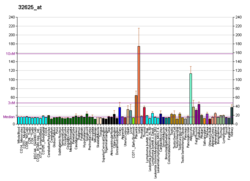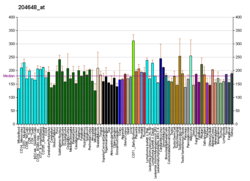Top Qs
Timeline
Chat
Perspective
NPR1
Protein-coding gene in the species Homo sapiens From Wikipedia, the free encyclopedia
Remove ads
Natriuretic peptide receptor A/guanylate cyclase A (atrionatriuretic peptide receptor A), also known as NPR1, is an atrial natriuretic peptide receptor. In humans it is encoded by the NPR1 gene.
Remove ads
Function
NPR1 is a membrane-bound guanylate cyclase that serves as the receptor for both atrial and brain natriuretic peptides (ANP and BNP, respectively).[5]
It is localized in the kidney[6] where it results in natriuresis upon binding to natriuretic peptides. However, it is found in even greater quantity in the lungs and adipocytes.[6]
See also
References
Further reading
External links
Wikiwand - on
Seamless Wikipedia browsing. On steroids.
Remove ads






